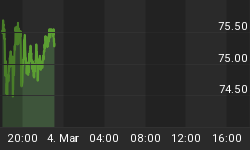We hope you have a chance to read our rebuttal to CNNMoney.com's recent Great Depression article. While we have described the 1930 peak before (all the way back in October of 2006), we feel our analysis has been vindicated. We may take some flak for getting too far out ahead of the parade back in 2006; but our readers know we discuss long term trends. (Check our chart below on personal savings!) The reasoning in October was correct;
"Higher rates will prevent many from refinancing out of their adjustable rate mortgages. Reports from Fannie Mae state that over $1 trillion dollars in mortgages will reset at higher rates in 2007. Many U.S. homeowners, whose savings rate is negative, will not be able to withstand this financial pressure. As they default, the third wave and credit crunch will begin."
With the popping of the credit bubble early last year, mortgage losses are now threatening to collapse the fractional reserve banking system. For financial institutions and consumers that are underwater, cash is needed to pay off debt. The U.S. government is assisting the consumer by providing stimulus checks. The Federal Reserve is providing emergency loans to the banking system. They will fail against market forces. For investors, preservation of principal is paramount.
We are entering the 'third wave down', the deflationary vortex, where a decline in confidence reduces prices, consumers and investors reduce purchases in expectation of lower prices, less spending and investment weakens the economy, resulting in defaults on debts, causing more losses in the financial system, which reduces credit available, forcing consumers and investors to cut back on more spending, causing further declines in confidence.

Photograph by Jonathan Minard
Bankers are attempting to save themselves by fudging the numbers.

Mega Trends - Mega Thrift
As gas prices have risen, consumers here in Alabama have drastically reduced their consumption. SUV's and diesel trucks are being replaced by the wife's Toyota for trips around town. Now that American consumers have been caught in the debt vise of falling assets and rising costs, the new long term trend is reducing consumption/increasing savings. After the Great Depression, the savings rate increased for the next 40 years (chart below).

Chart from The Big Picture
How Long Do We Sit In Cash?
How do we know we are correctly positioned? Because most investors cannot stand being in cash. One advisor describes "clients have been 'kicking and screaming' about low yields." They are eager to "pursue riskier investments in search of higher yields." Contrast this with George Soros' recent comments: "The days of rapid financial wealth creation are over. We're now in a period of wealth destruction. It is going to be very hard to preserve your wealth in these circumstances."
"A bear market is a financial cancer that spreads. Intermediate rallies (occasionally very strong ones) keep the hopes of investors alive. Furthermore, by continuously publishing bullish reports, brokers and economists, like good nurses, keep the flame of hope from burning out. But after 18 to 36 months of continued losses, total capitulation usually sets in and a major low occurs." - Dr. Marc Faber
More follows for Clients and Subscribers...
The Wall Street Broker
Is your current financial advisor conflicted? Are they providing you with wise and independent advice? Is your cash supporting their companies' balance sheet? Or does its own involvement in the credit meltdown provide an incentive to keep you fully invested? We have elected to stand on the side of the client, with no loyalties to any financial institution.
At Lamont Trading Advisors, we provide wealth preservation strategies for our clients. For more information, contact us. Our monthly Investment Analysis Report requires a subscription fee of $40 a month. Current subscribers are allowed to freely distribute this report with proper attribution.
***No graph, chart, formula or other device offered can in and of itself be used to make trading decisions. This newsletter should not be construed as personal investment advice. For informational purposes only.















